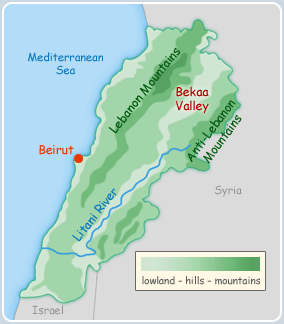 It is great to be Dutch. Especially after arrival in Boudai, a cannabis- or marijuana growing village in Lebanon's Beka'a valley. "Hey," the villagers tell me, "We're expecting the Dutch dealer only in December."
It is great to be Dutch. Especially after arrival in Boudai, a cannabis- or marijuana growing village in Lebanon's Beka'a valley. "Hey," the villagers tell me, "We're expecting the Dutch dealer only in December." As I wasn't the dealer but just a Dutch journalist, they explain me how things work here.
"We'll be harvesting anytime soon," Abu Ali, the owner of a cannabis field, says. As we walk towards it, you can smell the marijuana.
 "This must be a relaxed village," I ask.
"This must be a relaxed village," I ask."Oh, yeah, it is," replies Abu Ali. In the meantime, another chap, named Bessam, walks along. "Top quality goes for 1000 usd a kilo," Bessam claims.
Boudai's return to cannabis production started - as with almost everything in nowadays Lebanon - with the killing of Lebanese ex-PM Rafik Hariri. Or, in other words, with the collapse of the Lebanese state.
Until his killing, in 2005, Boudai had been clean. It did not grow cannabis for over ten years. Almost fifteen years of relative peace in Lebanon had strengthened the state. Even here, in the notoriously lawless Beka'a valley, police and army men patrolled the streets. Cannabis, massively produced here during the civil war, became a forbidden fruit, or better, plant. Without cannabis, the villagers of Boudai grew potatoes.
 So Hariri got killed. And anti-Syrian members of parliament, politicians and intellectuals started, involuntarily, to drop dead on Beirut's streets. Then, a Summer war between the radical Shi'ite militia Hezbollah and Israel. Followed by an overly confident Hezbollah trying to overthrow the Lebanese government by boycotting parliament and starting violent street protests. The result of this was clear: Hatred between Sunni's (mostly pro-government) and Shiites (anti-government). To make matters worse: Lebanon has to choose, by the end of November, a new president to replace the current pro-Syrian and pro-Hezbollah one. Government and opposition can't agree on a candidate. Hezbollah and its christian allies of Michel Aoun have threatened to set up a parallel government with a president of their own.
So Hariri got killed. And anti-Syrian members of parliament, politicians and intellectuals started, involuntarily, to drop dead on Beirut's streets. Then, a Summer war between the radical Shi'ite militia Hezbollah and Israel. Followed by an overly confident Hezbollah trying to overthrow the Lebanese government by boycotting parliament and starting violent street protests. The result of this was clear: Hatred between Sunni's (mostly pro-government) and Shiites (anti-government). To make matters worse: Lebanon has to choose, by the end of November, a new president to replace the current pro-Syrian and pro-Hezbollah one. Government and opposition can't agree on a candidate. Hezbollah and its christian allies of Michel Aoun have threatened to set up a parallel government with a president of their own.This remarkable downward spiral has made the central government even more of a lame duck.
"Because of the the Summer War and the political chaos in 2006," continues Abu Ali, "We though: Hey, screw these potatoes and let's plant some cannabis. More or less as a test. Let's see if the police will come and try to destroy the crops."
But the cops did not show up. Instead, a Dutch drug dealer arrived. Cannabis was back in the Beka'a valley. "We said to each other: Damn, why did we not plant more!."
So this year, almost everybody in the village exchanged potatoes for cannabis. And not only here in Boudai (which is a muslim shi'ite village), but in at least ten other neighbouring villages (both shi'ite and christian).
 A couple of weeks ago, policemen tried to enter Boudai and burn down the crops. But the men from the village got their rifles and Kalashnikov ready and opened fire on the police. "Well, not at them, but above their heads," says Abu Ali. "They all went down and fled," he smilingly claims.
A couple of weeks ago, policemen tried to enter Boudai and burn down the crops. But the men from the village got their rifles and Kalashnikov ready and opened fire on the police. "Well, not at them, but above their heads," says Abu Ali. "They all went down and fled," he smilingly claims.So now everybody here is waiting for the Dutch drug dealer. Because the Dutch guy means money and there is a chronic lack of money in this part of Lebanon.
"Most people are very poor," says Bessam, "Potatoes alone just do not do it."
"Hezbollah is, due to religious reasons, against cultivating cannabis," claims Abu Ali. "So we told them: Ok, we'll stop growing this stuff if you supply us with jobs and a monthly salary of 500 usd. They told us they did not have the money to do that."
Last question: Will 2008 be another cannabis year for Boudai?
"For sure," says Abu Ali, "We are probably one of the few people in Lebanon who hope for continuing political turmoil. To us it would be good when they can't elect a new president."
Harald Doornbos

2 comments:
see how practical people can be. this is true grass-roots politics.
@ mp
oh yeah! lol
Post a Comment